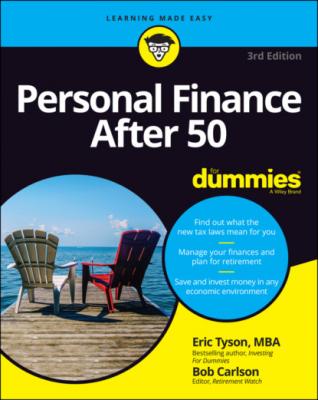Personal Finance After 50 For Dummies. Eric Tyson
Читать онлайн.| Название | Personal Finance After 50 For Dummies |
|---|---|
| Автор произведения | Eric Tyson |
| Жанр | Личные финансы |
| Серия | |
| Издательство | Личные финансы |
| Год выпуска | 0 |
| isbn | 9781119724087 |
Foolish Assumptions
When writing this book, we made some assumptions about you:
You’re around age 50 or older and are approaching or are in retirement or at least thinking about it more these days.
You’re probably still in the workforce and have no plans to retire, which is fine and compatible with our approach in this book too.
You want expert advice about important financial topics, and you want easy-to-understand answers.
You want a crash course in personal finance and are looking for a book you can read to help solidify major financial concepts and get you thinking about your finances in a more comprehensive way.
Throughout this book, we offer many resources, including websites and online tools to help you, as well as plenty of alternative off-line resources and assistance.
Icons Used in This Book
The icons in this book help you find particular kinds of information that may be of use to you. Here’s a rundown of what each icon means:
Beyond the Book
In addition to the material in the print or e-book you’re reading right now, this product also comes with some access-anywhere goodies on the web. To get the free Cheat Sheet, simply go to www.dummies.com and search for “Personal Finance After 50 For Dummies Cheat Sheet.” Here you will find such things as stats on the age at which you can retire and the benefits you will receive, additional information on Medicare, and how to protect your pension.
Where to Go from Here
This book is organized so you can go wherever you want to find complete information. Want advice on managing and tracking your expenses in retirement? See Chapter 6. If you’re interested in investing strategies and developing a retirement plan, cruise on over to Part 2. If you’re not sure where you want to go, you may want to start with Part 1. It gives you all the basic info you need to assess your financial situation and points to places where you can find more detailed information for improving it. Check out the table of contents for a chapter-by-chapter rundown of what this book offers. You also can look up a specific topic in the index. Last but not least, you can turn to Chapter 1 and begin reading for a complete and thorough crash course in personal finance during your golden years.
Part 1
Understanding Personal Finance After 50
IN THIS PART …
Get complete and easy-to-understand guidance on how to best plan for a secure financial future.
Find out how to protect your employment income and protect your health.
Develop a plan that will see you through your retirement years by discovering the best retirement investments and strategies, and understanding retirement account rules.
Chapter 1
Looking Ahead to Your Future
IN THIS CHAPTER
From a young age, various adults in our lives tell us to plan ahead. Although it may be sunny and clear outside this morning, they tell us to take rain gear for this afternoon’s forecasted heavy rain. When packing for a day at the beach, they suggest sunscreen and money for lunch. And do your best in high school, they say, because your transcript will in part determine which colleges accept you.
Although some parents provide guidance to their children on the topic of long-term financial planning, most don’t because they aren’t sufficiently knowledgeable or are reluctant to explain these things to their kids. And therein lays a pretty significant problem concerning finances for your adult and especially later adult years.
And retirement has its own set of trials. Unexpected life events (such as a loss of a job, the death of a loved one, or a major medical problem) and economic challenges can throw a wrench in the best plans. The severe recession and stock market decline in the late 2000s — both of which were the worst in decades, and then the 2020 COVID-19 pandemic — highlight other potential planning obstacles. Many near retirees and recent retirees caught off guard face the possible need to keep on working beyond typical retirement age, the need to reduce spending and make do with less (for example, one car rather than two), and the need to cope with the loss of jobs, diminished investment portfolios, and reduced home values.
These challenges can occur at any time during life, but they’re especially challenging when they happen when you’re in or near retirement. You have less time to make up for setbacks (and any mistakes you make) as you age. At some point in most folks’ lives, working longer or going back to work no longer are viable options. That’s why planning and regularly reviewing and reevaluating your plans is essential.
We know many of you are reading this book having done little or no planning to this point. Don’t worry, though. It’s not too late to start planning. Studies of retirees show those who are most content in
